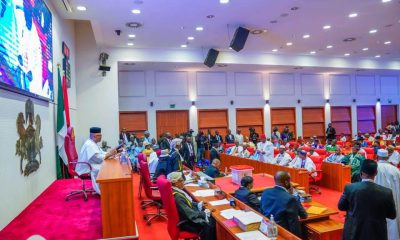Nigeria News
CBN Reveals New Information On Cash Withdrawal Limits

The Central Bank of Nigeria (CBN) has said the new cash withdrawal limits was a continuation of the cashless policy launched in 2012.
Naija News reports that the Deputy Governor of Financial System Stability, CBN, Aisha Ahmad, made this known while appearing before the House of Representatives on Thursday.
She said the new policy was introduced in recognition of the positive changes that have happened in the financial and payment system since the cashless policy was first introduced ten years ago.
Ahmed disclosed that some of the changes include a wide proliferation of payment system that includes bank branches, branches of micro-finance banks, POS machines, ATMs, agent banking, e-Naira and many other options.
She said, “Today, we have a very robust payment system that includes bank branches, branches of micro-finance banks, POS machines, ATMs, agent banking, e-Naira and many other options.
“To be specific, between the bank and the micro-finance banks, we have 6,500 locations, 900,000 POS terminals, 14,000 ATMs across the country and 1.4 million agents nationwide; and every local government area in Nigeria has agents represented. We have also seen a proliferation of electronic transactions.
“Just by way of a quick example, in 2012, we had N48bn in POS transactions. Today, we have N6tn in POS transactions. On electronic transfers, we had N3tn in 2012; today we have N300tn as at October 2022. That is a 7,000 per cent increase.
“We have also seen an improvement in financial inclusion to 64.1 per cent and lastly, perhaps, more importantly, we have seen the evolution of the Nigerian payment system on the global stage. Nigeria is adjudged 6th in the world for an instant, real payment and we are only behind countries like India, China, Thailand, Brazil and South Korea. We are the only African country in the top 10 and this has been as a result of some of the initiatives that have gone on.
“Also, electronic payment and real-time data payments have been estimated to contribute about 0.67 per cent to our GDP.”












